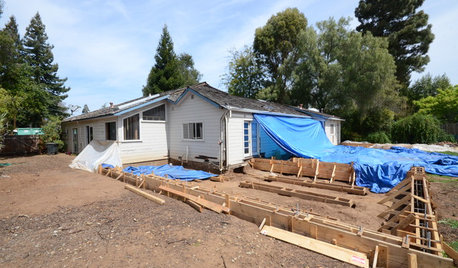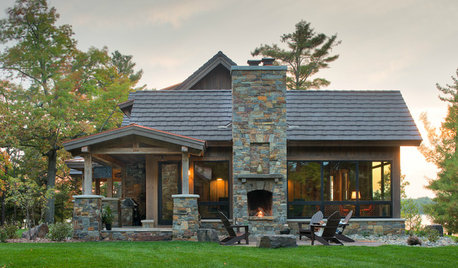bank-owned winterized home: inspection and mortgage questions
Hello,
Would love anyone's experience/comments on the following:
- inspecting a winterized house: need to de-winterize, inspect, then re-winterize: pricey, risky (what if it had not been winterized properly)
(Note: the inspector we hired to do inspection strongly recommends AGAINST buying a foreclosed home as he's done many inspections on those and found that they're not worth the value).
- mortgage question (chicken and egg): this house may be considered NOT liveable right now, since the furnace looks like it doesn't work (can't tell/been winterized), so until the furnace is replaced and proof that there is heat, we won't be able to live in there. if we don't live in there, the mortgage company may NOT give us the mortgage for the house. but until we close on the house (thus get approved for a mortgage), how can we replace the furnace?
Would the mortgage lender allow us to borrow $ for the mortgage and then an equity loan to fix up the house while we live somewhere else (an apartment)? I thought banks only lend $ if you live in the house.
- are foreclosed or bank-owned properties worth their cost and effort?
We are looking in very expensive towns for their school systems for our 2 young children. So any house (normal or bank-owned) we can actually afford needs work, like updating (or gutting) the kitchen, new carpet, update the bathrooms, etc. So we thought if we get a bank-owned home for a lower price, we would do all the updating that we would have to do on another house anyway.
thank you for any help/advice,
huango
Comments (23)
mmelko
17 years agolast modified: 9 years agoWells Fargo offers a restoration/renovation loan program that would provide you with the funds to fix up the house. It's similar to the FHA 203K home rehab program. Tons of info online about the loans. Other mortgage companies offer similar loan programs.
melbat
17 years agolast modified: 9 years agoDon't buy the house unless it can be de-winterized and the heat and plumbing can be tested.
Related Professionals
Palos Verdes Estates Architects & Building Designers · Bellingham General Contractors · Bowling Green General Contractors · Fitchburg General Contractors · Goldenrod General Contractors · La Marque General Contractors · Lewisburg General Contractors · Lincoln General Contractors · Makakilo General Contractors · Medford General Contractors · Redan General Contractors · Statesboro General Contractors · Richfield Home Stagers · Round Lake Home Stagers · Arkansas Interior Designers & Decoratorsnancylouise5me
17 years agolast modified: 9 years agoWhen we were looking at homes when we moved to Southern Maine we looked at a banked owned home. You could tell the inside needed work. What you couldn't tell was what was the electrical, plumbing, insulation,etc like. The bank was no help in giving out information on any questions we wanted to know. They didn't want to take responsibility for anything. I am so glad we did not buy that house. The owners that did end up buying it had to raise the whole house to fix the foundation. They had a spring running underneath the basement. There was no insulation at all, the whole roof needed repair and so did a lot of the clapboards. They took a gamble and lost. Sunk much more money into the house then they had expected to do. They were not happy campers. NancyLouise
cordovamom
17 years agolast modified: 9 years agoI'm glad this question came up on such a timely basis! My son and his fiancee just purchased a foreclosure and have their inspection scheduled for next week. I didn't even think about the fact that the home had been winterized hampering the inspection.
The bank is selling the home as is, but the home is only 3 years old and cosmetically in perfect condition. We're just hoping the innards are working right. The sale is contingent upon an inspection, even though the bank isn't going to fix anything, my son just wants to know what if anything is wrong with the home.
How does one go about de-winterizing the home so that it can be inspected properly? Does the Home Inspector take care of this?
dave_donhoff
17 years agolast modified: 9 years agoHi Huango,
- mortgage question (chicken and egg): this house may be considered NOT liveable right now, since the furnace looks like it doesn't work (can't tell/been winterized), so until the furnace is replaced and proof that there is heat, we won't be able to live in there. if we don't live in there, the mortgage company may NOT give us the mortgage for the house. but until we close on the house (thus get approved for a mortgage), how can we replace the furnace?
THIS is "the fix & flip investor's gamble."
Here's who has the possibility of winning;
Experienced renovation investors that know the costs (in advance) of fixing various potential problems, have a strong list of reliable contractors/handymen/self-experience, and have a good chunk of side cash to bury into the deal in actual repair costs and/or carrying costs along the way.Here's who loses;
Newbies looking for "great deals" and thinking that the foreclosure market is obviously where they can be found.As for financing... GENERALLY speaking, bank repos that aren't in certifiable occupiable condition are only financeable with private equity (hard money) funding. This type of lending is generally at 10-14%, costs 2-10 points, and (the good news) is interest-only without any prepayment penalty. It also requires that you bring at least 30-35% cash as down payment... "skin on the table" as the lenders call it.
If you are the prior description (or almost there,) then rest assured that you can afford to be patient now. There are a LOT of bank repos coming on the market in the next 12-24 months... LOTS of great deals for the prepared.
Be prepared!
Cheers,
Dave Donhoff
Strategic Equity & Mortgage Plannerkelpmermaid
17 years agolast modified: 9 years agoHow close are you to thaw-time?
I used to sell REO for a bank and purchased my last residence (granted, a condo) from a bank. Banks usually sell "As Is" with no representations or warranties because, frankly, they have not lived there and don't know the property that well. Assume that if the prior owners could not hold on to the property, maintenance was probably not their priority. The bank may be willing to address minor code issues, but don't expect them to do much beyond what it takes to protect their asset. They may be willing to offer financing to you. Do you know how long they have owned it?
You could make an offer with contingencies for financing and inspection, including major systems such as roof, HVAC, and plumbing. Factor in what you expect it will cost to bring the property up to speed. Based on what you see, you can further adjust your price for whatever else needs replacement. It might help to line up qualified contractors to obtain bids for repairs for follow up inspections if necessary to justify your price. You might also ask the bank if they have had any such inspections/estimates done; they will be sensitive to disclosure requirements.
You should also think about your own financial position and pain threshold regarding renovation costs. And then there is the aggravation factor, but only you know your own thresholds there. It's often a hurry up and wait scenario when buying REO.
quiltglo
17 years agolast modified: 9 years agoDave, what about homes which don't have a central source of heat or plumbing? We still have houses here in town with no plumbing and only a wood stove. Most do have electricity. Heck, we have entire towns with no plumbing or central heat systems. Would those not qualify for a mortgage for a primary residence?
To the OP, the question of the type of heat system would be important to me. It's easy to turn on natural gas or electricity and fire up the furnace. If it is hot water heat on a boiler system, I would not de-winterize it just to test it if you are still in winter in your location. But I also know the price of a new boiler and pipes and could have a heating system up and running within just a few days with any of our local plumbers. I would not de-winterize the plumbing, but I would crawl behind the inspector looking for any water damage or signs of leaks.
Since you are in a very expensive area, I personally would be willing to do this type of house. Updating things can be done over time with saved funds as long as the house is basically functional.
Gloria
logic
17 years agolast modified: 9 years agohuango:"(Note: the inspector we hired to do inspection strongly recommends AGAINST buying a foreclosed home as he's done many inspections on those and found that they're not worth the value)."
Although the above is probably good advice, a professional home inspector is supposed to be objective...and in accordance with national standards and most if not all state regs, never offer an opinion on whether or not the home should be bought. The job of the home inspector is to inform the buyer about material defects and safety concernsit is then up to the buyer to decide if the house is worth buyingÂ..or not.....and not the HI.
cordovamom: "How does one go about de-winterizing the home so that it can be inspected properly? Does the Home Inspector take care of this?"
Home inspectors inspect homes....nothing more. If the water is turned off, or if the gas supply is turned off, or if the electricity is turned off, then most of what the home inspector does inspect can't be inspected.
Competent home inspectors will not turn any of these systems on, as there is no way to know what will happen if they do...in terms of property or even bodily damage. That is why it is the sole responsibility of the property owner to make sure all systems are operational pre-inspection.
If they won't do so.., a buyer is generally in the position to decide whether or not to move forward without most of the info that he/she would need in order to be able to make such a decision in any way that is meaningful.
IMO, such a situation is caveat emptor indeed......as under such circumstances a buyer should be prepared to have a blank check ready to fund any and all replacements and repairs that may materialize once all systems are operational.
dave_donhoff
17 years agolast modified: 9 years agoHi Gloria,
Dave, what about homes which don't have a central source of heat or plumbing? We still have houses here in town with no plumbing and only a wood stove. Most do have electricity. Heck, we have entire towns with no plumbing or central heat systems. Would those not qualify for a mortgage for a primary residence?
The answer is "yes, in general... and maybe, in Alaska..."
There are different lenders that have different appetites for different portfolios of loans. There are also frequently community-subsidized mortgages for rural areas on a case-by-case basis... so that's often the solution to be found.
Cheers,
Dave Donhoff
Strategic Equity & Mortgage Plannercordovamom
17 years agolast modified: 9 years agologic -- the home my son purchased has electricity and gas, the bank is keeping the utilities on for some reason. The home has been winterized because there are signs posted within the home stating this. After reading this thread I got a bit worried and called the home inspector and asked him how he'd do an inspection on a winterized home. He said as long as the house had power he could do an inspection on the whole house, he'd turn on the water etc. The bank is okay with him doing this. Winter is well over, (it's 77 degrees here today). the bank has made no mention of my son having the home re winterized if the contract falls through -- is this normal?
huango
Original Author17 years agolast modified: 9 years agoI thank everyone very much for their inputs.
Update:
1. Talked to my mortgage guy:
- Since the town didn't condemn the house, then it's considered 'liveable'. So I can get a mortgage for while renting elsewhere while work is being done at the house.
- Instead of putting down 40%, we're planning to put down 25%, borrow 75% (no PMI). That leaves about 15% to get the house updated.2. Saturday: we're going with a general contractor to get a better guesstimate of how much all the following would cost:
- new furnace (forced hot air/gas)
- gut/update kitchen
- gut/update 2 bathrooms
- remove old oil tank and old rusted furnace
- new double-wide garage door/door opener
- refinish/?buff all the hardwood floors
- maybe update the electrical from 100amps to 200amps
What are your guesses for the total cost for the MA Boston suburb area?
Also, what's your guess on how long this process would be?
3months? 5months?3. While the house is winterized, the electric was on.
We're planning to replace the furnace.
So the plumbing is the only questionable issue.
What is the process to de-winterize a house, especially in terms of plumbing?
It was 52 degrees here today; supposed to be 60 tomorrow/Friday. But we would have to re-winterize it because you never know in New England what the weather will be the next. How is that done?4. Any concerns about an inground pool that is at a higher grade than the foundation of the house (the backyard slopes up a bit from the house to the pool)? This pool hasn't been used in years. Could it leak down toward the house? There doesn't seem to be any water damage anywhere in the house/basement.
How much does it cost to get an inground pool back to functioning?thank you for any advice or experience you can share,
Huangohousekeeping
17 years agolast modified: 9 years agoHuango,
It's good that there is still power because that will make it easier to de-winterize and do an inspection, and then reverse the process.
I used to have the care of a family home in the Berkshires and I have winterized and de-winterized it many times, and it's not a big deal. Even a non-plumber could do it if they were thoroughly familiar with the building. In your case of course you will have a real plumber, so no worries there.
Basically the process is one of starting up the heating system to warm the house, then charging the pipes and water supply system to test for leaks from frost damage. Since you have forced air, you will have no worries about leaking within a hydronic (hot water system). You will have to figure where the gas is coming from. Piped-in gas (natural gas) will have to be turned on and metered (and perhaps some sort of account set with the gas compnay to pay for it, though maybe the bank can arrange that for you?). If it's propane-fired, then you will need to make sure there are propane tanks on site and that there is some remaining gas in them. You may need a plumber experienced or licensed for this aspect, so ask ahead of time about this. It might be possible to run a test using a small portable propane tank (like the ones used for BBQ grills, but that's nothing I would fool around with on my own). Propane tanks are often the property of the gas supplier and it's possible it/they could have been removed after the PO moved out.
Anyway, gas will be supplied to the furnace and the house heated. As soon as temps are above freezing, the plumber will close any open drains and fire up the water pump or open the mains (depending on whether you have public or private water supply). Then the water will be turned on at each tap (don't worry if it's initially quite nasty looking, it will probably clean up pretty fast). At this point it will become a more normal-type of home inspection, but the inspector and plumber will be keeping an eye on things to make sure no small leaks occur after the initial start up. You will want to run a lot water, flush all the toilets, etc during this phase.
(As an aside if you were planning on doing any water potability testing on the water -usually you need to do this when you will have a private water source or well - try to run a huge amount of water through the system before the test water is drawn. Static water is often icky and will test dirty. Firing up the system a second time just to do another water test -should you have to treat and re-do- will add to the expense, so using a lot of water before you draw the test is best.)
Anyway, after the system has been pressurized and all the lines checked to make sure they work and don't leak, then what happens in a re-winterization would be the reverse. First the water pump would be turned off or the incoming water line is shut off, then the taps would be opened until no more water comes out. Then the lines would be further opened at their low points and any residual water drained into buckets and dumped outside. The plumber may use air pressure to drive water out of the lines, as well. Finally, the toilets would be flushed and antifreeze poured down their traps to protect any remaining water in their curvy places. Sometimes people put anti-freeze down all the drain traps. It just depends on your system.
The complexity of this depends on whether the system was planned to make it easy to do or not. In my family's house we put in easy-to-open draincocks at the lowest point in all the lines, so it was very simple and straightforward. One just went from numbered drain to numbered drain and opened each and let it run to dry. We even had a numbered metal tag which hung on each drain point or water line; when you had collected all the tags, you knew you had drained everything. Then it was simple matter to do each toilet, etc. Depending on your system, you should also have a plan to fill and drain the water heaters and any ice-makers or washing machines included in the house as they have water-supply lines, too. Your HI should test all the outdoor hose bibs, as well.
When it's all back down again, just remember to shut off the gas lines and any incoming water line if you have public water.
In an unoccupied house that's it. The time needed to get the house up and running is more than shutting it off. We had oil-fired hot water radiators and water heating (much more complicated than your prospective house), two toilets one tub, three sinks, a washing machine and three outdoor hose bibs. I could get it shut down, drained and fully winterized in less two hours. Getting it up and running usually took half a day because of relighting the furnace and getting the antique h/w radiators back in service (always a tedious hissing and spitting affair that only the antique plumber we used knew how to do properly). I usually closed it myself, but always had the plumber come to get it back up again.
I hope this gives you enough of general idea of what to expect from the winterization process. It's much easier in an empty house because there is nothing outside of the "normal" sytems to break and freeze as there always is in a house with personal stuff in it. For instance if you forget to drain the reservoir on a steam iron, it can freeze and break (no need to ask me how I know this!); it's remembering or ferreting out little things like that which are the biggest pain in a winterization project, but that won't be your problem.
The only other thing is that it might be good to have the house heated for a few days so you can see how all the other non-water aspects are at a normal temp. Unheated houses can develop issues with floors, wall or plaster cracks, paneling moving, etc. Most can be worked out, but it might be better to know about them when negotiating with the bank. Unlike a typical seller, I think you should feel absolutely free to renegotiate your offer if the home inspection reveals additional issues. At least with bank you won't have the problem of a seller taking it personally. The bank just wants to get the most amount of money it can, as soon as it can. Bankers have a better grasp of the present value of money than many "civilian" sellers who get emotionally invested in their RE deals.
Good luck with the project, I hope it goes well. REOS sometimes take so long to get sorted out, it may be warm enough to just leave the system up - even in MA, Spring does come, eventually!
Molly~
huango
Original Author17 years agolast modified: 9 years agoMolly: thank you so much for all that info. It was very thorough and descriptive, so helpful in understanding what that whole process really means.
We can't de-winterize/heat up the house until we've put in an offer. So let's see what the contractor says tomorrow/Saturday. If all the work is w/in our budget, then we'll put in an offer. Then we can get the plumber/inspectors in to get really check out the house.
Question: Is it a possibility to negotiate the Asking Price on a bank-owned house being sold "As Is"?
I thought that being "As Is", there would be no allowances (price reductions) to accommodate for any issues (like new furnace, etc).
thank you,
it's already 44 degrees here! woohoo! (it was 2 degrees here last week). :)cordovamom
17 years agolast modified: 9 years agohuango,
The foreclosure that my son and his fiancee just bought (pending inspection) was built in 2003 for $179,000. The bank foreclosed with a balance of $157,000 being owed by the previous owner. The bank listed the home back in October for $179,000 but dropped it a few times over the following several months til it was $154,900. My son and his fiancee offered $150,000 and the bank to pay $6000 in closing costs. The bank countered with $152,000 and $6000 in closing costs. The home is being sold as is. If the inspection finds anything my son can either walk, take the home as is, or go back to the negotiating table. The bank may or may not bend to lowering the price after that. They'll weigh their options and the slow housing market and see whether it's in their best interests bottom line to negotiate again or wait for another buyer.
The same thing will probably happen with your home. The bank will weigh it's options and may decide that "as is" means as is and stick with the price or they may be desperate for a buyer and lower their price.
kelpmermaid
17 years agolast modified: 9 years ago"As Is" means they're not willing to fix things, not necessarily that they won't deal. How long they have had it and the market prospects may influence their view on price. The thing is to do one's homework on the general market and specific costs entailed in bringing it up to speed. Be willing to walk if it does not work for you.
logic
17 years agolast modified: 9 years agocordavamom: "He said as long as the house had power he could do an inspection on the whole house, he'd turn on the water etc. The bank is okay with him doing this. Winter is well over, (it's 77 degrees here today). the bank has made no mention of my son having the home re winterized if the contract falls through -- is this normal?"
I can't speak for what is normal with a bank. That said, obviously if the house has power and gas, the electrical and HVAC system can indeed be inspectedand of course, roof structural, which are non-utilities dependent.
However, IMO, the HI is a fool to turn on the water....as he is bargaining that there are no problems with the plumbing that could cause property damage. Granted, with a 3 year old home, the chance of that being the case is less than with an older home...however, with a foreclosure, all bets are off as far as the norm...as all too often foreclosed properties are damaged due to owners who want pay-back because of the foreclosure (such as those who were duped by the predatory lenders) or, in a divorce, people can get mighty vindictive. Sometimes the damage is obvioussometimes hidden.
We had neighbors who divorced. They had a beautifully upgraded home, very well maintained; the hubby was the original owner of the house brand new, pre-marriage. They split because the wife was having an affair; she continued to live in the house with the children...then had affair guy move in with her. Needless to say, soon to be X was VERY upset...the house went into foreclosure. Wife and affair guy moved out.
The bank held an open house through a realtorand we were shocked to see what had been done to the insidedamage everywherethe couple who bought it spent thousands on repairsand he was a contractor..so labor was not an issue.
That said, your son needs to make certain that the HI carries errors and omissions insurancethat way, if any damage occurs once the water is turned on, the HI has the financial resources with which to cover it....in addition, your son should make sure that there is some sort of condition in the HI contract where your son cant be held for damages due to the HI turning on the water when he hasnt a clue as to whether of not there is a plumbing problem
Last but not least, the water should be on for at least 48 hours prior to inspection, in order to determine if there are any leaks as water somtimes needs a while to circulate before some problems can become evident
Last but not least, as you son has no claim to the property, the bank, as the owner/seller would be responsible for any required "winterization", unless your son signed something agreeing otherwise
Hope this helpslogic
17 years agolast modified: 9 years agoHuango: "remove old oil tank and old rusted furnace"
If the oil tank is above ground...you need to find out if it was the original tank...if not, you need to find out where the previous tank was located...if there was one..as the house could have been converted from coal, etc.
If it was underground, you need to find out if it was removed...and if so, was it decommissioned properly in accordance with state regs.
Underground oil tanks can leak oil...if the soil is not checked, and oil has leaked..and worse yet, migrated to neighboring properties, remediation can cost thousands....sometimes hundreds of thousands.It is VERY important that you obtain this info...because if there is oil in the soil, you buy the liability with the house...
cordovamom
17 years agolast modified: 9 years agoLogic -- thanks for all the information, I did find it very informative. I called the HI on my son's behalf with my concerns and he told me he only had to turn on the water because the listing agent for the bank had already had the home de winterized when it went under contract. So we're good to go on that. Thanks again for your help.
coolvt
17 years agolast modified: 9 years agoRather than de-winterizing, you could probably get a plumbing and heating guy in to pressurize the water system and the heating system if it's hot water. He can check the drain traps to see if the anitfreeze mix is still in there. If it is, then they probably are okay.
Pressurizing seeems much easier to me. Of course it won't tell you if the furnace runs.kellyeng
17 years agolast modified: 9 years agoI'm just glad someone finally explained what "winterizing" means (says the girl from Texas)!
huango
Original Author17 years agolast modified: 9 years agoQuick update:
- we got cold feet and passed on the house.The last straw on this neglected house is that it's septic (and not town sewer); they change that info last night. We can't imagine where the ?septic container? is... ?under the inground pool?
Thank you for everyone's input.
We've moved onto another house, yet with another issue: how to get the town's permission to move the driveway's entrance from one FAST street to another sideSLOW street.
Any experience with that? (I posted in Builing a Home).seeuthere62_yahoo_com
13 years agolast modified: 9 years agoHELLO
WE ARE ABOUT TO SEE HOW THIS ALL WORKS...LIVING IN THE NORTHEAST PART OF THE COUNTRY AND IT GETS COLD !! WELL WE FOUND A HOMEPATH HOME THAT NEEDED SOME WORK ,MINOR STUFF AND MY WIFE LIKES THE HOME .SO WE PUT A BID IN ON THE HOME AND IN OUR PAPERWORK IT STATES THAT THE BANK WILL DE WINTERIZE THE HOME FOR INSPECTIONS AND RE WINTERIZE IT AFTER WE ARE DONE INSPECTIONS.WELL HOMEPATH SENT OUT A PLUMBER TO GET THE HOT WATER FURNACE UP AND WORKING SO WE CAN GET THIS DONE ,BUT THE PLUMBER SAID THERE IS PROBLEMS WITH THE HEATING SYSTEM...HE CAME OUT TO PUT WATER IN AND IT CAME BACK OUT ,GUESSING SOME OF THE PIPES ARE SPLIT FROM FREEZING .THEY CANT GET THE UNIT UP AND WORKING AND WE CANT GET THE INSPECTIONS DONE...SO WILL HOMEPATH FIX THIS TO MAKE THE HOME MARKETABLE??? OR WILL THEY COME DOWN ON THE PRICE SINCE WE CAN NOT DO ANY INSPECTIONS ON ANYTHING .I CAN'T SEEM TO GET A ANSWER FROM ANYBODY,MY REALTIOR SAID WE HAVE TO WAIT FOR THEM BUT OUR 10 DAY INSPECTION WINDOW WILL PASS THIS FRIDAY AND STILL NOTHING AND ITS FEBUARY ,NO SIGNS OF WARM WEATHER YET ...

















brickeyee